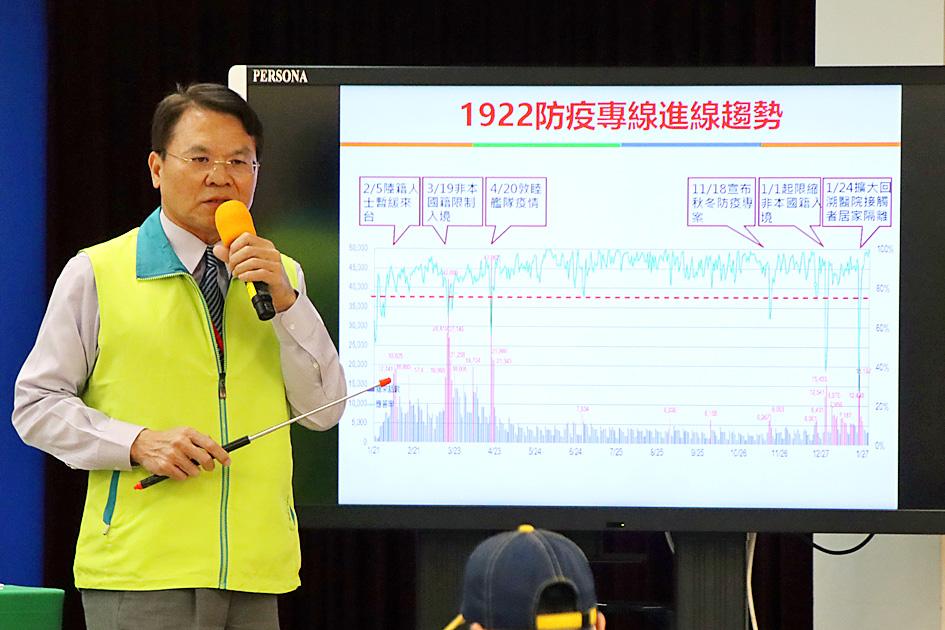The Central Epidemic Command Center (CECC) yesterday said that its toll-free 1922 hotline had received more than 2.02 million calls in the past year, contributing greatly to conveying correct information about COVID-19.
The 1922 hotline was established after the SARS outbreak in 2003 for the Centers for Disease Control to answer public inquiries about diseases, Chunghwa Telecom Co assistant vice president Chuang Wen-ming (莊文明) said at a CECC news conference yesterday.
The more that 2.02 million calls were received from the outbreak of COVID-19 early last year to the end of last month, about 30 times the number of calls received in the same time period in 2019, he said.

Photo courtesy of the CECC
About 84,000 callers with more complicated questions were transferred to the relevant departments, he added.
There were six peak periods when the number of calls surged, Chuang said, adding that the most calls, 47,000, were received on April 20 last year, when a cluster of COVID-19 infections was reported on a navy ship.
Additional staff had to be immediately dispatched to support the customer service center during these periods, but the hotline still achieved an average response rate of 85.4 percent in the past year, higher than the 80 percent goal that the CECC had set, he said.
The three most common types of questions asked were about “isolation, leave of absence and self-health management,” followed by “home quarantine regulations” and “home quarantine settlement problems,” Chuang said, adding that more than 16,000 calls, or about 1.1 percent, were answered in English.
For inquiries about COVID-19, people can call 1922 when in Taiwan or +886-800-001-922 when in other countries, or e-mail their question to cdc1922@cdc.gov.tw, the CECC said.
Meanwhile, Minister of Health and Welfare Chen Shih-chung (陳時中), who heads the center, said that the ministry’s Advisory Committee on Immunization Practices on Monday concluded that there should be at least eight weeks between receiving the first and second doses of the Oxford-AstraZeneca COVID-19 vaccine.
The Food and Drug Administration on Saturday issued emergency use authorization for the AstraZeneca vaccine in Taiwan, and required that the two doses be given four to 12 weeks apart, Chen said.
However, the committee extended the recommended minimum interval between the two doses to at least eight weeks, based on two references, he said.
Data released by Oxford researchers showed that the vaccine was 76 percent effective in preventing symptomatic infection for three months after a single dose, and its efficacy rose to 82.4 percent when there was at least a 12-week interval before the second dose, Chen said.
The WHO also issued interim recommendations for use of the AstraZeneca vaccine on Feb. 11, which said the two doses should be given eight to 12 weeks apart, he said.
No new COVID-19 cases were reported in Taiwan for the third consecutive day yesterday, the CECC added.
Separately, the Ministry of Transportation and Communications said that from Tuesday next week, people can eat and drink on Taiwan Railways Administration (TRA) and Taiwan High Speed Rail Corp (THSRC) trains again.
A ban on eating and drinking on railways was imposed on Feb. 1 after a cluster inflection was reported at Taoyuan General Hospital.
The ministry said that railway passengers would be allowed to temporarily take off their masks when eating and drinking, provided that they observe social-distancing guidelines and take disease-prevention measures.
The main hall of the Taipei Railway Station and lobbies at other railway stations would also be opened again for people to lease for events, it said.
THSRC would also provide non-reserved cabins again, and the TRA would cancel the limit on standing tickets, it added.
Additional reporting by Shelley Shan

The Grand Hotel Taipei on Saturday confirmed that its information system had been illegally accessed and expressed its deepest apologies for the concern it has caused its customers, adding that the issue is being investigated by the Ministry of Justice Investigation Bureau. The hotel said that on Tuesday last week, it had discovered an external illegal intrusion into its information system. An initial digital forensic investigation confirmed that parts of the system had been accessed, it said, adding that the possibility that some customer data were stolen and leaked could not be ruled out. The actual scope and content of the affected data

DO THEY BITE IT? Cats have better memories than people might think, but their motivation is based entirely around the chance of getting fed Cats can remember the identity of the people who fed them the day before, Taipei-based veterinarians said on Friday, debunking a popular myth that cats have a short memory. If a stray does not recognize the person who fed them the previous day, it is likely because they are not carrying food and the cat has no reason to recognize them, said Wu Chou Animal Hospital head Chen Chen-huan (陳震寰). “When cats come to a human bearing food, it is coming for the food, not the person,” he said. “The food is the key.” Since the cat’s attention is on the food, it

‘LIKE-MINDED PARTNER’: Tako van Popta said it would be inappropriate to delay signing the deal with Taiwan because of China, adding he would promote the issue Canadian senators have stressed Taiwan’s importance for international trade and expressed enthusiasm for ensuring the Taiwan-Canada trade cooperation framework agreement is implemented this year. Representative to Canada Harry Tseng (曾厚仁) in an interview with the Central News Agency (CNA) said he was increasingly uneasy about Ottawa’s delays in signing the agreement, especially as Ottawa has warmed toward Beijing. There are “no negotiations left. Not only [is it] initialed, we have three versions of the text ready: English, French and Mandarin,” Tseng said. “That tells you how close we are to the final signature.” Tseng said that he hoped Canadian Prime Minister Mark Carney

Taiwan must act to preempt potential Section 301 investigations as US President Donald Trump moves to a new tariff strategy, following a US Supreme Court ruling that voided tariff measures, an academic said yesterday. Countries running the largest trade surpluses with the US face a growing likelihood of Section 301 investigations, Chung-Hua Institution for Economic Research president Lien Hsien-ming (連賢明) said. Section 301 refers to a provision of the Trade Act of 1974 that allows Washington to impose retaliatory tariffs over perceived unfair trade practices, including the running of large trade surpluses. Because Taiwan has become the fourth-largest source of the US’ trade